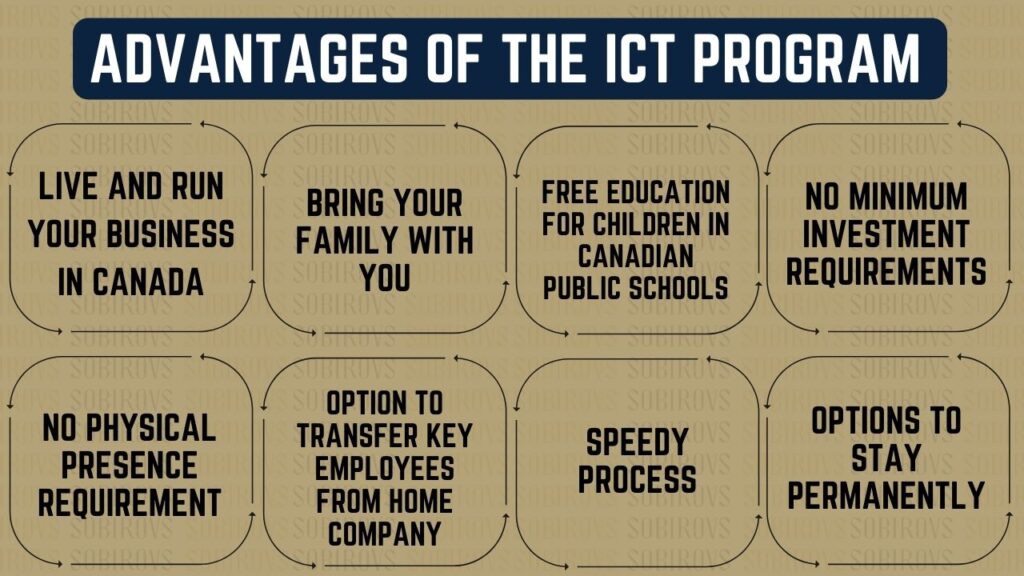Intracompany




The Canadian immigration framework provides for various business immigration routes. Canada’s Intra Company Transfer (ICT) program is well-suited for foreign business owners who wish to expand their existing operations to Canada. On this page, you will learn the details of the ICT program, including the program requirements, advantages, application process, and pathways to transition to permanent residency.
What is Intra Company Transfer?
ICT is an immigration pathway under the International Mobility Program that allows qualified foreign business owners to transfer their businesses to Canada and acquire a work permit. Through the ICT pathway, you will be able to secure an ICT Work Permit and eventually permanent residence (PR). In most cases, the principal applicant’s spouse and children will gain an open work permit and study permit, respectively.
ICT Canada is not the only business immigration program available to you. Take our free instant assessment and learn about your immigration options. You can also receive valuable advice from our business immigration lawyers during our 60-minute strategy meeting.
Who Can Apply for the ICT Program?
The intra-company transfer program is designed to attract established companies from all around the world to expand their operations to Canada. There are 3 categories of individuals who may benefit from this program:
- Business owners, entrepreneurs, and shareholders of successful companies who are currently holding executive positions in that company and who intend to do similar work in Canada.
- Senior managers and functional managers who are currently working in a foreign company and intend to occupy a similar position in Canada.
- Key employees of a business who have advanced specialized knowledge that is unique or uncommon.
Individuals who occupy one of the positions above must also meet several additional requirements as described below in order to secure a work permit under the ICT program.
Intra-Company Transfer Canada Requirements
Entrepreneurs who own successful businesses in their home countries can apply for the ICT WP to expand their business to Canada. There are several additional requirements that entrepreneurs must meet in order to secure a work permit under the ICT program, including the following:
- The home company must be operational for at least 12 months (but ideally for at least 3 years) before expansion to Canada;
- The home company must be financially sound and capable of supporting foreign operations in Canada;
- The applicant seeking an ICT WP must be working/engaged with the home company for at least 12 months in the past three years prior to the immigration application;
- The home company must be related to the company in Canada as a parent, subsidiary, or affiliate company; and
- Canadian operations will be a viable enterprise and result in job creation for Canadians.
If it is an initial expansion to Canada of a foreign company, then immigration officers will also check to confirm the following:
- Is there a sound business plan that demonstrates that Canadian operations will be a viable enterprise and can generate sufficient revenue to cover its costs and compensate its employees?
- Will this expansion result in job creation for Canadians?
- Will the company be large enough to require an executive or a manager in Canada?
Thus, if it is the first ICT application in Canada, companies are required to establish that expansion to Canada makes business sense for the company and that the newly established operations in Canada are likely to succeed and become large enough to hire local staff. Therefore, for companies expanding to Canada for the first time, it is critical to present a solid business case and explain the rationale for expansion in addition to meeting basic eligibility criteria for the ICT applications.
Investment Amount for the Initial Expansion of your Business to Canada
The Canadian government does not set any minimum investment amounts for companies expanding to Canada. However, the companies must be financially sound and have the required capital to support their new operations in Canada and hire local talent.
Therefore, in our experience, companies must be able to demonstrate solid gross sales exceeding $250,000 per year and access to liquid funds in the amount of at least $100,000 to cover the first year’s operational costs. In addition to the initial investment capital, applicants should demonstrate that they have access to additional funds or assets to support the business in Canada if it does not reach self-sufficiency by the end of year 1.

How to Apply for Intra Company Transfer Work Permit?
To apply for any immigration program in Canada, applicants must first confirm if they meet the eligibility criteria for that program. Applicants must also develop a solid strategy on how to present their case to the Canadian immigration authorities. Next, applicants need to collect strong evidence to support their immigration application and include detailed explanations on how they meet the eligibility criteria and why their presence in Canada is required.
If it is your first ICT application, follow the steps below:
- Step 1: Register your company in Canada as a parent, subsidiary or affiliate of your home company
- Step 2: Prepare a business plan outlining the proposed business activity, market research and how do you plan to run a profitable operation in Canada. Make sure to include your hiring plan and cash flow projections for at least 2-3 years in accordance with the industry standards.
- Step 3: Collect all the required documents (such as bank statements, articles of incorporation, evidence of investment funds, etc.) and prepare your work permit application; and
- Step 4: Submit your work permit application and wait for the decision.
It is important to note that the process varies greatly depending on the applicant’s nationality. Some countries benefit from having agreements with Canada, which allows their citizens a more lenient immigration journey under the ICT.
In cases where the applicant is a citizen of a visa-exempt country, it may be possible for them to apply for an ICT WP at the port of entry (POE).
Canada Intra Company Transfer Visa Processing Time
In general, standard processing times apply to the ICT WP applications and can be checked on the IRCC’s website specific to your country.
In our experience, the following are the average processing times for specific offices around the world:
- Ankara Office: 6+ months
- New Delhi Office: 3-4 months
- Abu-Dhabi Office: 6+ months
- Ho Chi Minh city: 3+ months
Please note that very often, ICT applications for executives and managerial staff are processed by the CPC-Edmonton office in Canada. This office seems to use a case processing technology “Chinook” and therefore delivers decisions in an expedited manner. If your application is sent to the CPC-Edmonton office, it is likely that you will get a decision in 1-2 months. However, in our practice, we noticed that the rejections rates from the CPC-Edmonton office are usually higher than in other offices. Thus, strategizing with an immigration lawyer about where to send your application might be a good idea.
ICT Work Permit Duration
ICT work permits are usually issued for 1 – 2 years. If they are employed by a start-up company, then the WP will only be valid for 1 year. Some nationals from the visa-exempt countries benefit from a 3-year WP. The WP can be renewed for additional 2 – 3 years for a total of up to 5 years for specialized knowledge workers and 7 years for executives & managers.
However, immigration officers may issue work permits for only 1 year to individuals who will be employed by newly established companies in Canada. US nationals and other citizens from the visa-exempt countries (like Australia, UK, EU, Japan etc.) may benefit from Free Trade Agreements their countries have with Canada and obtain a 3-year ICT work permit.
Under the program, it is possible to obtain a WP through a Labour Market Impact Assessment (LMIA) exemption (C12). However, in some cases, LMIA will be required.
Canada ICT to PR Transition
After one year of full-time employment for the Canadian company, the foreign national may become eligible to apply for PR through the Express Entry program. Depending on the employment role, the foreign national may be eligible to receive 50 or 200 additional points for an arranged employment (job offer) from their own business in Canada.
This normally results in a significant increase in their Comprehensive Ranking System (CRS) score, which can lead to the selection under the FWS category of the EE stream and an invitation to apply for PR from the immigration authorities.
Intra Company Transfer Canada and International Free Trade Agreements
Several countries benefit from having international agreements with Canada, which allows for special benefits under those Treaty ICT applications. Nationals of the following countries can utilize Treaty ICT regulations: United States (CUSMA), Mexico (CUSMA), Chile, Columbia, Peru, Korea, European Union (CETA), Australia (CPTPP), Japan (CPTPP), Mexico (CPTPP), and New Zealand (CPTPP).
